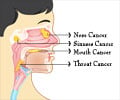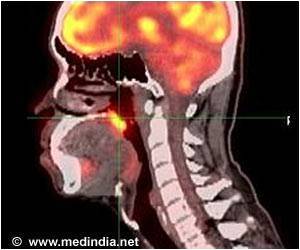Researchers have found that a simple mouthwash test could help predict the recurrence of head and neck cancers by detecting specific biomarkers in saliva.
- Mouthwash-based tests can detect biomarkers linked to head and neck cancer recurrence
- Elevated levels of CD44 and total protein increase the risk of cancer returning
- Rapid, point-of-care tests are in development, promising early intervention
Salivary CD44 and Total Protein Levels to Detect Risk for Oral and Oropharyngeal Cancer Recurrence: A Nonrandomized Clinical Trial
Go to source).
A routine mouthwash could soon help predict cancer recurrence! #medindia #cancerawareness’
Future of Mouthwash: Detecting Cancer Recurrence Through Biomarkers
This promising development stems from a study conducted by researchers at the Sylvester Comprehensive Cancer Center, University of Miami Miller School of Medicine, UC San Diego Health, and other collaborating institutions. The study, published in the August 15th issue of JAMA Otolaryngology – Head & Neck Surgery, highlights the potential of a mouthwash-based test to enhance the prediction and detection of cancer recurrence in patients with head and neck cancers.According to Dr. Elizabeth Franzmann, a head and neck surgeon at Sylvester and co-corresponding author of the study, the detection of biomarkers in saliva collected from an oral rinse after initial treatment could significantly improve how physicians assess the risk of cancer recurrence. "Our study suggests biomarker detection in saliva collected from an oral rinse after initial treatment offers potential to readily assess recurrence risk," said Dr. Franzmann. She further noted that elevated levels of specific biomarkers were closely linked to the likelihood of cancer returning.
Head and Neck Cancer: A Closer Look
Head and neck cancers account for nearly 4% of all cancers in the United States, with men being more than twice as likely as women to be diagnosed with the disease, according to the National Cancer Institute. These cancers are more commonly diagnosed in individuals over the age of 50 and can have a profound impact on a patient's quality of life, especially if the cancer recurs after treatment.Primary treatment options, such as surgery and radiation, can have severe side effects, including difficulties with speech, and swallowing, and changes in appearance. These effects can become even more debilitating if the cancer returns, making early detection crucial. However, identifying recurrence is often challenging. "It can be very difficult to determine if what you’re observing is just post-treatment changes or a cancer recurrence," explained Dr. Joseph Califano III, director of UC San Diego’s Hanna and Mark Gleiberman Head and Neck Cancer Center, and co-corresponding author of the study. He emphasized that reliable biomarkers could help reduce the uncertainty involved in monitoring these patients.
The Role of Biomarkers in Assessing Recurrence Risk
Dr. Franzmann and her research team have been exploring the use of biomarkers in oral rinses as a method for assessing the risk of developing oral or oropharyngeal tumors, which are the most common types of head and neck cancers. In previous studies, they identified two key biomarkers—CD44, a molecule associated with tumor initiation, and total protein levels—as indicators of cancer risk.In their latest study, the researchers investigated whether these biomarkers could also predict the recurrence of cancer in patients who had already been diagnosed and treated. The clinical trial involved over 160 patients across multiple cancer centers, who provided oral-rinse samples up to 18 months after their initial treatment.
Using laboratory assays and experimental lateral-flow tests, similar to those used in pregnancy and COVID-19 tests, the researchers measured the presence of these biomarkers. Their findings indicated a strong association between elevated biomarker levels and the risk of cancer recurrence. "Compared to patients with normal protein levels three months after treatment, patients with about twice as much total protein had an estimated 65% greater risk of recurrence," Dr. Franzmann reported. Additionally, patients with CD44 levels three times higher than normal were found to have an estimated 62% greater risk of cancer returning.
Advancing Rapid, Point-of-Care Testing
One of the most exciting aspects of this research is the potential for developing a rapid, point-of-care test to measure these biomarkers. Such a test could be performed during a routine office visit, providing immediate results and allowing for timely interventions. "It would be really useful if we had a test that was inexpensive and could be performed and resulted while the patient was in the office," said Dr. Franzmann.While further research is needed to refine these tests, the study’s findings indicate that biomarkers hold great promise for improving risk prediction in patients with head and neck cancers. Enhanced risk prediction could, in turn, lead to more effective treatment strategies, potentially reducing the need for invasive procedures and improving patient outcomes. The researchers also extended their gratitude to Vigilant Biosciences for their contribution to this important work.
Reference:
- Salivary CD44 and Total Protein Levels to Detect Risk for Oral and Oropharyngeal Cancer Recurrence: A Nonrandomized Clinical Trial - (https://pubmed.ncbi.nlm.nih.gov/39145961/)
Source-Medindia
















